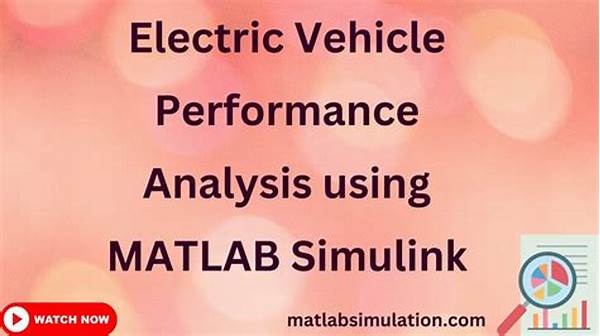
“holistic Electric Vehicle Performance Evaluation”
Electric vehicles (EVs) are rapidly transforming the automotive landscape, promising a greener, more sustainable future. However, the decision to switch from traditional combustion engines to electric power is multifaceted, requiring an in-depth understanding of EV performance. A holistic electric vehicle performance evaluation is crucial for consumers, manufacturers, and policymakers to make informed decisions that will shape the future of transportation. This comprehensive assessment isn’t just a choice; it’s a necessity in our quest for a cleaner planet.
Read Now : Live Data Monitoring For Fleets
The Importance of Comprehensive EV Assessment
To truly appreciate the potential of electric vehicles, one must engage in a holistic electric vehicle performance evaluation. This process goes beyond simple speed and range metrics, encompassing critical factors such as battery longevity, charging infrastructure, environmental impact, and cost efficiency. By understanding these elements, consumers can make informed choices, while manufacturers can innovate more effectively. A holistic approach ensures that we are not merely replacing one technology with another but genuinely improving the way we travel. It’s not only an evaluation—it’s a pathway to sustainability.
Key Elements of a Holistic Evaluation
1. Battery Performance: Understanding battery life and efficiency is central to holistic electric vehicle performance evaluation. A persuasive analysis reveals how advanced batteries extend driving range and reduce costs.
2. Charging Infrastructure: Evaluating the availability and speed of charging networks is vital. Comprehensive assessments convince stakeholders of the investment needs for seamless EV adoption.
3. Environmental Impact: Highlighting EVs’ reduced carbon footprint compared to traditional vehicles is persuasive. It underlines the significance of transitioning for environmental health.
4. Cost-Benefit Analysis: A thorough evaluation includes potential savings over a vehicle’s lifespan, emphasizing financial prudence in adopting EV technology.
5. Technological Advancements: Staying abreast of innovations in EV technology is essential. This ensures continuous improvement in holistic electric vehicle performance evaluation.
Holistic Evaluation in Action
A successful transition to electric vehicles hinges on effective holistic electric vehicle performance evaluation. By examining every facet—from performance metrics to environmental benefits—individuals and institutions will be empowered to make significant contributions to a sustainable future. The electric vehicle revolution offers a unique opportunity to significantly reduce our carbon footprint; however, seizing this opportunity requires a detailed approach. Understanding the breadth of performance evaluation allows us to harness the full potential of EVs while paving the way for continuous innovation and improvement.
Persuasive Insights for EV Stakeholders
1. Consumer Confidence: Holistic electric vehicle performance evaluation serves as a guide for consumers. Encouraging informed decisions, it highlights key benefits and assures buyers of their investment.
2. Policy Formulation: Policymakers rely on comprehensive performance evaluations to enact supportive legislation. This drives forward infrastructure development and market growth.
Read Now : “preventive Maintenance For Vehicle Fleets”
3. Industry Innovation: Auto manufacturers use evaluation data to refine designs and improve product offerings, ensuring competitiveness and future-readiness.
4. Environmental Advocacy: Holistic evaluation delivers compelling evidence of EVs’ positive environmental impact, galvanizing public and private sector support.
5. Long-Term Vision: A detailed understanding of performance metrics assists in creating sustainable business models that benefit the economy and the environment.
Comprehensive Understanding Through Holistic Evaluation
Adopting a holistic electric vehicle performance evaluation is more than a technical exercise; it’s an all-encompassing strategy to revolutionize transportation. By scrutinizing aspects as diverse as energy efficiency, user experience, and societal impact, such evaluations offer an integrated perspective essential for widespread adoption of electric vehicles. As companies strive to meet consumer demand and regulatory standards, this approach is indispensable to ensure product reliability and customer satisfaction.
The Path Forward: Continuous Evaluation
Continuously refining the holistic electric vehicle performance evaluation is vital for the industry’s success. Furthermore, consumer education is enhanced as more data becomes available, promoting wider acceptance of EV technology. Each evaluation cycle provides invaluable insights, equipping stakeholders with tools to address emerging challenges while fostering innovation. As we collectively move towards an electrified future, these evaluations will play an instrumental role in driving technological progress.
Summarizing the Value of Holistic Evaluation
In today’s world, where sustainability is a global priority, embracing a holistic electric vehicle performance evaluation is not optional—it’s imperative. This multifaceted assessment framework ensures that electric vehicles are not only viable today but are set to meet the challenges of tomorrow. By meticulously considering the environmental, economic, and social implications of EVs, we can facilitate a smooth transition to a cleaner, more efficient transportation ecosystem.
The Compelling Need for Comprehensive Evaluation
Going beyond simple performance metrics necessitates a holistic electric vehicle performance evaluation. By integrating diverse considerations—from technical specifications to ecological impacts—stakeholders can confidently navigate the complex landscape of modern transportation. Such a thorough approach ensures that the potential of electric vehicles is fully realized, fostering innovation and encouraging adoption across the globe. The path to a sustainable future begins with informed evaluations and decisive actions.